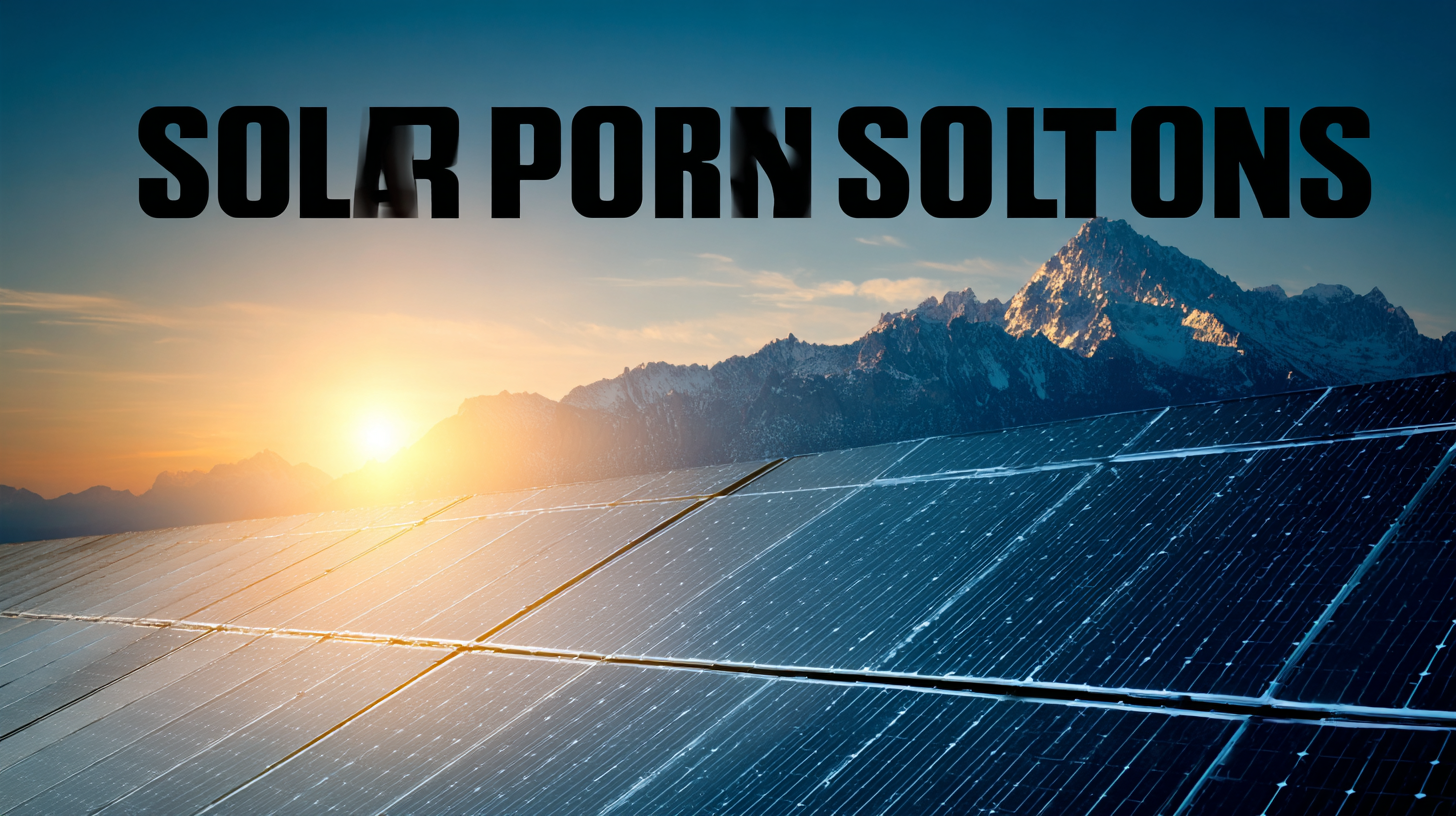Choosing the Right Manufacturer: How to Identify the Best Solar Panel Solutions in the Market
The solar energy market has witnessed significant growth in recent years, driven by advancements in technology and increasing environmental awareness. According to the International Energy Agency (IEA), solar power capacity reached a remarkable 970 gigawatts globally in 2021, with projections indicating it could account for over 20% of the global power generation by 2040. As homeowners and businesses seek reliable and efficient Solar Panel Solutions, selecting the right manufacturer becomes crucial. The variety of products on the market can be overwhelming, with different specifications and technologies offering distinct advantages. A careful examination of detailed technical parameters, including efficiency rates, warranties, and installation options, is essential for making informed decisions. This blog aims to guide readers through the process of identifying the best manufacturers and their solar panel offerings, ensuring a sound investment in sustainable energy.

Understanding After-Sales Service: Key Features to Look For in Solar Panel Manufacturers
When selecting a solar panel manufacturer, understanding after-sales service is crucial for ensuring a positive long-term experience. Key features to look for include responsive customer support, clear warranty terms, and a comprehensive maintenance plan. A reputable manufacturer should offer technical assistance and be available to address any concerns that arise post-installation. This accessibility can significantly affect the longevity and efficiency of your solar panels.
Another important aspect to evaluate is the availability of replacement parts and service stations. Manufacturers who invest in after-sales service usually have a network in place to provide quick repairs and component replacements. This not only minimizes downtime but also enhances the overall sustainability of your solar power system. Furthermore, having access to regular updates about product upgrades and technological advancements can contribute significantly to the longevity and efficiency of your solar installation, making it a worthwhile investment in the long run.
Evaluating Maintenance Costs: What to Expect and How to Budget for Repairs
When evaluating solar panel solutions, it's crucial to not only consider initial costs but also ongoing maintenance expenses. Understanding these costs can help in budgeting and making informed decisions. "Repair and Maintain" strategies often emerge as a practical option for many institutions, including schools. Regular maintenance can significantly extend the lifespan of solar panels, ensuring efficient energy production over the years.
Tips for budgeting maintenance costs include setting aside a percentage of the initial installation cost annually for repairs and monitoring system performance. Consider engaging with reliable contractors who are transparent about potential repair costs and schedules. This proactive approach can help avoid unexpected financial burdens down the line.
Furthermore, it's important to factor in any warranties or service agreements when evaluating manufacturers. A solid warranty not only provides peace of mind but also reduces financial risk associated with unexpected maintenance issues. By choosing the right manufacturer with comprehensive maintenance support, schools can secure their investment in solar technology effectively.
Digital Tools for Tracking Performance: Why a Tech-Forward Manufacturer Matters
In the evolving landscape of solar energy solutions, the importance of identifying a tech-forward manufacturer cannot be overstated. As companies strive to become increasingly digital and data-driven, leveraging advanced technologies is crucial for optimal performance tracking. A recent report indicates that organizations prioritizing investments in their digital and data infrastructure reported a 30% increase in operational efficiency. This underscores the need for manufacturers to adopt digital tools that enable real-time monitoring and management of solar panel systems, enhancing both performance and sustainability.
The integration of digital twins and generative AI presents a significant opportunity for the solar sector. These technologies can streamline the deployment of monitoring systems, facilitating better predictions regarding energy production and system maintenance. Firms that embrace this tech-forward mindset are not only positioned to improve their service offerings but also contribute to a more sustainable energy framework, aligning with global trends toward carbon-conscious practices. As businesses pivot to become tech companies, selecting a manufacturer that prioritizes technological innovation will be beneficial to stakeholders aiming for a competitive edge in the solar panel market.

Top Tips for Assessing Manufacturer Reputation: Reviews, Certifications, and Awards
When choosing the right manufacturer for solar panels, it's crucial to delve into the manufacturer's reputation. A reputable manufacturer will likely have a history of positive reviews and feedback from their customers. Researching customer testimonials and third-party evaluations can provide insight into the company's reliability and product performance. Look for manufacturers that have received industry awards as this often reflects a commitment to quality and innovation.
Another essential aspect to consider is certifications. The presence of recognized certifications indicates that a manufacturer adheres to specific quality and environmental standards. Additionally, undergoing a Corporate Sustainability Assessment can reveal how the company engages with sustainability practices and their overall impact on the environment. As customers demand more transparency, understanding a manufacturer's sustainability profile can help you make more informed choices that align with ethical consumption practices. Recognizing these factors will ultimately guide you to the best solar panel solutions that meet your needs.

The Importance of Warranty Policies: How They Impact Long-Term Solar Panel Investments
When investing in solar panel solutions, one of the most critical factors to consider is the warranty policy offered by the manufacturer. A strong warranty can be an indicator of the quality and durability of the product. According to a recent report by the National Renewable Energy Laboratory (NREL), solar panels typically have a lifespan of 25 to 30 years, and a comprehensive warranty can significantly mitigate the risks associated with this long-term investment. Most manufacturers offer warranties that cover defects in materials and workmanship for 10 to 25 years, which not only protects the consumer but also reflects the manufacturer's confidence in their product.
In addition to covering manufacturing defects, warranty policies can also include performance guarantees that ensure panels maintain a certain efficiency level over the years. The Solar Energy Industries Association (SEIA) highlights that a typical performance warranty guarantees at least 80% output for 25 years. This is crucial because degradation rates influence overall energy production and return on investment. With solar energy becoming increasingly cost-effective, taking the time to scrutinize warranty policies can enhance consumer confidence and ensure that your long-term investments yield reliable returns.